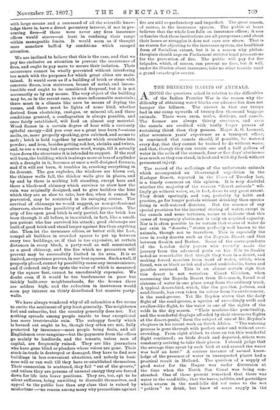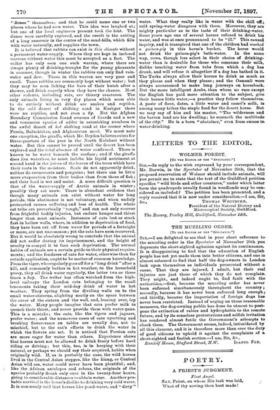THE DRINKING HABITS OF ANIMALS.
The record of the sufferings of the unfortunate animals which accompanied an ill-arranged expedition in the Kashgar Desert, reported in the Times of Tuesday last, is a timely comment on this opinion. It is very doubtful whether the majority of the various "desert animals" wil- lingly go without water, or, in fact, do so to any great extent. They drink sparingly, and can, probably by habit and practice, go for longer periods without drinking than species living in well-watered districts. But the absence of any special provision for the internal storing of water, except in the camels and some tortoises, seems to indicate that this rower of temporary abstinence is only an acquired capacity. Nor is it often possible to be certain that stores of water do not exist in " deserts ; " stores perfectly well known to the animals, though not to travellers. This is especially the case in rocky deserts such as the Bayuda Desert and that between Suakin and Berber. Some of the correspondents of the London daily papers who recently made the journey from the advanced posts on the Nile to Suakin noted as remarkable that though they were in a desert, and making forced marches from want of water, which, when found, was as black as ink and almost undrinkable, hares and gazelles swarmed. This is an almost certain sign that this desert is not waterless. Count Gieichen, when recrossing the Ba.yuda Desert from Iletemmeh, found real cisterns of water in one place away from the ordinary track. A typical desert-bird, whieh, like the gazelles, jerboas, and sand-lizards, has even taken its colour from it, environment, is the sand-grouse. Yet Mr. Dryden states that the daily flight of the sand-grouse, a species of exceedingly swift and swallow-like flight, to the water is one of the eights of the veldt in the dry season. "Their machine-like punctuality, and the wonderful displays afforded by their enormous flights at the desert-pools," form the subject of one of Mr. Bryden's chapters in his recent work on South Africa. "The watering process is gone through with perfect order and without over- crowding. From eight o'clock to close on ten this wonderful flight continued ; as birds drank and departed, others were constantly arriving to take their places. I should judge that the average time spent by each bird at and around the water was half an hour." A curious instance of animal know- ledge of the presence of water in unsuspected places had a practical result in Holland. The question of a supply of good water for the Hague was under discussion at the time when the North Sea Canal was being con- structed. One of those present remarked that there was water in the sand-hills; that the hares, rabbits, and partridges which swarm in the sand-hills did not come to the wet " polders " to drink, but knew of some supply in the
" dunes " themselves; and that he could name one or two places where he had seen water. This idea was laughed at; but one of the local engineers present took the hint. The dunes were carefully explored, and the result is the cutting of a long reservoir in the centre of the sand-hills, which fills with water naturally, and supplies the town.
It is believed that rabbits can exist in this climate without a permanent water-supply. Where they are kept in inclosed warrens without water this must be accepted as a fact. The waiter has only seen one such warren, where there are always plenty of drinking-troughs for the young pheasants in summer, though in winter the rabbits can only find rain- water and dew. Those in this warren are very poor and small. Tame rabbits are commonly kept without water ; but they may be seen licking the bare of their hutch after a shower, and drink eagerly when they have the chance. Most other rodents, including rate, are thirsty creatures. The only animals living in very dry places which seem able to do entirely without drink are snakes and reptiles. In the cold desert of shifting sand in Kasbgar there were no reptiles, and not even a fly. But the Afghan Boundary Commission found swarms of lizards and a new and venomous species of adder in astonishing numbers in the awful desert of hot shifting sand at the corner where Persia, Baluchistan, and Afghanistan meet. We must note one exception, the giraffe, which Mr. Bryden believes exists for three-quarters of the year in the North Kalahari without water. But this cannot be proved until the desert has been explored and the total absence of water confirmed. There is known to be water beneath the surface ; and if the giraffe does live waterless, he must imbibe his liquid nutriment at second hand in the juices of the leaves of the trees which have their roots in the moisture. Seals do not apparently drink, neither do cormorants and penguins ; but there can be little more evaporation from their bodies than from those of fish ; and their food is wet and moist. A more difficult question is that of the water-supply of Arctic animals in winter ; possibly they eat snow. There is abundant evidence that though many animals can exist without water for long periods, this abstinence is not voluntary, and when unduly protracted causes suffering and loss of health. The whole cat tribe are proverbially "tough," and can not only recover from frightful bodily injuries, but endure hunger and thirst longer than most animals. Instances of cats lost or stuck fast in hollow walls, where, in addition to deprivation of food, they have been cut off from water for periods of a fortnight or more, are not uncommon ; yet the cats have soon recovered. But it would be absolutely wrong to conclude that the animal did not suffer during its imprisonment, and the height of cruelty to compel it to face such deprivation. The normal habits of animals are a certain guide to their physical require- ments ; and the fondness of cats for water, otherwise than for outside application, ought to be matter of common knowledge. From the tiger, who regularly goes off for a "long drink "after a kill, and commonly bathes in hot weather, to the household pussy, they all drink water regularly, the latter two or three times a day. The writer has often watched from the high- level railways the London cats belonging to the small tenements taking their mid-day drink of water in hot weather. They spring from the dividing walls on to the small water-cisterns, alighting neatly on the space between the cover of the cistern and the wall, and, leaning over, lap the water. Many people imagine that cats prefer milk to quench their thirst, and never provide them with water-pans. This is a mistake ; the cats, like the tigers and jaguars, prefer water; and the numerous cases of cats upsetting and breaking flower-vases on tables are usually due, not to mischief, but to the cat's efforts to drink the water in which the flowers are set. It is noticed that Persian cats are more eager for water than others. Experience shows that horses must not be allowed to drink freely before hard aiding or driving ; but this, too, is in keeping with their natural, or perhaps we should say their acquired, habits when originally wild. If, as is probably the case, the wild horses lived in the Central Asian steppes, like the kiang, or Central Asian wild ass, water could never have been plentiful; and, like the African antelopes and zebras, the originals of the species probably drank only once in the twenty-four hours, going to considerable distances to obtain water. Another pro- bable survival is the horse's dislike to drinking very cold water. It is commonly said that horses like pond-water, and " dirty " water. What they really like is water with the dill QC: cold spring-water disagrees with them. Moreover, they are mighty particular as to the taste of their drinking-water. Some years ago one of several horses refused to drink his water, and was at once pronounced to be "ill." This caused inquiry, and it transpired that one of the children had washed a guineaopig in this horse's bucket. The horse would
not drink the guinea-pig's bath-water. In the same way, cows, though less select in their choice of drinking- water than is desirable for those who consume their milk, dislike touching water from tubs from which a dog has drunk, and will refuse it altogether if a dog has bathed in it. The Turks always allow their horses to drink as much as they please and when they please ; and the Osmanli were always accustomed to make long journeys on horseback. But the more intelligent Arabs, than whom no race except the English has paid more attention to the subject, give their horses little water,—a practice they follow themselves. A paste of flour, dates, a little water and camel's milk, is among many tribes the staple food for the desert horse. But we may say of him and his master, "The wilderness and the barren land are his dwelling; he scorneth the multitude of the city." He is a born "abstainer," even from excess in water-drinking.







































 Previous page
Previous page